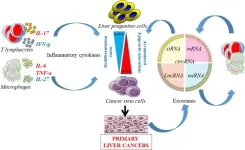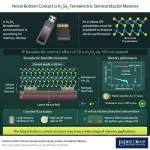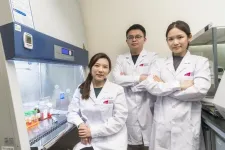(Press-News.org) NEW YORK, NY, AUGUST 16, 2023 — Surgeons at NYU Langone Health have transplanted a genetically engineered pig kidney that continues to function well after 32 days in a man declared dead by neurologic criteria and maintained with a beating heart on ventilator support. This represents the longest period that a gene-edited pig kidney has functioned in a human, and the latest step toward the advent of an alternate, sustainable supply of organs for transplant.
Multimedia Materials Available
Multimedia materials, including photos and a B-roll package, are available for download.
About the Procedure
The procedure, performed on July 14, 2023, and led by Robert Montgomery, MD, DPhil, the H. Leon Pachter, MD Professor of Surgery, chair of the Department of Surgery, and director of the NYU Langone Transplant Institute, was the fifth xenotransplant performed at NYU Langone. Observation is ongoing and the study will continue through mid-September 2023.
“This work demonstrates a pig kidney—with only one genetic modification and without experimental medications or devices—can replace the function of a human kidney for at least 32 days without being rejected,” said Dr. Montgomery, who had previously performed the world’s first genetically modified pig kidney transplant into a human decedent on September 25, 2021, followed by a second similar procedure on November 22, 2021. Surgeons with the Transplant Institute performed two genetically engineered pig heart transplants in summer 2022.
Removing Troublesome Gene Again Shows Promise
The first hurdle to overcome in xenotransplants is preventing so-called hyperacute rejection, which typically occurs just minutes after an animal organ is connected to the human circulatory system. By “knocking out” the gene that encodes the biomolecule known as alpha-gal—which has been identified as responsible for a rapid antibody-mediated rejection of pig organs by humans—immediate rejection has been avoided in all five xenotransplants at NYU Langone. Additionally, the pig’s thymus gland, which is responsible for educating the immune system, was embedded underneath the outer layer of the kidney to stave off novel, delayed immune responses. The combination of modifications has been shown to prevent rejection of the organ while preserving kidney function.
To ensure the body’s kidney function was sustained solely by the pig kidney, both of the transplant recipient’s native kidneys were surgically removed. One pig kidney was then transplanted and started producing urine immediately without any signs of hyperacute rejection. During the observation phase, intensive care clinical staff maintained the decedent on support while the pig kidney’s performance was monitored and sampled with weekly biopsies. Levels of creatinine, a bodily waste product found in the blood and an indicator of kidney function, were in the optimal range during the length of the study, and there was no evidence on biopsy of rejection.
The surgery was the latest in a larger study approved by a specific research ethics oversight board at NYU Langone and was performed after consultation with the New York State Department of Health. This important research, which study leaders say could save many lives in the future, was made possible by the family of a 57-year-old male who elected to donate his body after a brain death declaration and a circumstance in which his organs or tissues were not suitable for transplant.
LiveOnNY, the nonprofit organization that facilitates organ and tissue donation in the greater New York City area, was a critical partner in the effort to inform, support, and collaborate throughout the authorization process with the donor family.
A Big Leap Toward a New Organ Source
In the United States, there are more than 103,000 people on the waiting list for transplant, with nearly 88,000 of those waiting for a kidney, according to recent federal Organ Procurement and Transplantation Network (OPTN) data. In 2022, about 26,000 people received a kidney transplant. Meanwhile, nearly 808,000 people in the U.S. have end-stage renal disease.
“There are simply not enough organs available for everyone who needs one,” said Dr. Montgomery, who received a hepatitis C–positive heart transplant himself in 2018. “Too many people are dying because of the lack of available organs, and I strongly believe xenotransplantation is a viable way to change that.”
The kidney and thymus gland used in this procedure were procured from a GalSafeTM pig, an animal engineered by Revivicor, Inc., a subsidiary of United Therapeutics Corporation. In December 2020, the U.S. Food and Drug Administration (FDA) approved the GalSafe pig as a potential source for human therapeutics as well as a food source for people with alpha-gal syndrome, a meat allergy caused by a tick bite.
Less May Be More in Kidney Xenotransplants
While previous genetically engineered pig organ transplants have incorporated up to 10 genetic modifications, this latest study shows that a single-gene knockout pig kidney can still perform optimally for at least 32 days without rejection.
“We’ve now gathered more evidence to show that, at least in kidneys, just eliminating the gene that triggers a hyperacute rejection may be enough along with clinically approved immunosuppressive drugs to successfully manage the transplant in a human for optimal performance—potentially in the long-term,” said Dr. Montgomery.
The NYU Langone team used standard transplant immunosuppression medications combined with enhanced screening of porcine cytomegalovirus (pCMV) in the donor pig to ensure safety. Recent studies have shown pCMV may affect organ performance and potentially trigger organ failure. No pCMV was detected after 32 days, and close surveillance of porcine endogenous retrovirus (PERV), along with six other viruses of interest, was performed.
Next Steps
Monitoring of the pig kidney recipient will continue for another month with permission from the family, ethics committee approval and continued support from United Therapeutics. The additional data from the next several weeks will be analyzed further to develop a deeper understanding of this unique medical advance.
“We think using a pig already deemed safe by the FDA in combination with what we have found in our xenotransplantation research so far, gets us closer to the clinical trial phase,” said Dr. Montgomery. “We know this has the potential to save thousands of lives, but we want to ensure the utmost safety and care as we move forward.”
GalSafe is a trademark of Revivicor, Inc.
Media Inquiries
Colin DeVries
Phone: 212-404-3588
colin.devries@nyulangone.org
END
Pig kidney xenotransplantation performing optimally after 32 days in human body
2023-08-16
ELSE PRESS RELEASES FROM THIS DATE:
ASBMB names 2024 award winners
2023-08-16
The American Society for Biochemistry and Molecular Biology announced today the winners of its annual awards. Colleagues and other leaders in the field nominated the winners for making significant contributions to biochemistry and molecular biology and the training of emerging scientists.
The recipients will give talks about their work at the society’s 2024 annual meeting, Discover BMB, slated for March 23–26 in San Antonio.
In addition to cash prizes ranging from $2,000 to $35,000, each ASBMB award consists of a plaque and transportation ...
New and updated resources published to help guide oncology care in the Middle East and North Africa (MENA)
2023-08-16
PLYMOUTH MEETING, PA [August 16, 2023] — The National Comprehensive Cancer Network® (NCCN®)—an alliance of leading cancer centers—today announced that a library of resources for improving cancer care in the Middle East and North Africa (MENA) has been updated and expanded in collaboration with regional experts. The United States-based non-profit has worked with the King Abdulaziz Medical City in Riyadh, Saudi Arabia, since 2015 to standardize cancer treatment based on the latest evidence and expert-consensus, as part of the MENA-NCCN Regional Coordinating Center. Their efforts have led to the ...
Gray wolf recovery is a success—is that a problem?
2023-08-16
Over the past 30 years, efforts to recover gray wolf populations in the United States have been broadly successful, with many regions now sporting robust populations of the charismatic carnivore. Writing in BioScience, wolf experts David E. Ausband and L. David Mech describe the conservation landscape and also the obstacles that wolves face as their populations expand into their historical ranges.
"Remarkable wolf conservation success yields remarkable challenges," ...
Common wristbands ‘hotbed’ for harmful bacteria including E. coli, staphylococcus
2023-08-16
The COVID-19 pandemic took disinfecting to new heights. Now, a new study examining a commonly used item might convince you not to let your guard down just yet.
Researchers from Florida Atlantic University’s Charles E. Schmidt College of Science tested wristbands of various textures to determine their risk for harboring potentially harmful pathogenic bacteria. Despite being worn daily, routine cleaning of wristbands is generally overlooked or simply ignored.
For the study, researchers tested plastic, rubber, cloth, leather ...
What is the next step in preventative therapies for treating liver cancer?
2023-08-16
Primary liver cancers ranked as the sixth most commonly diagnosed cancers and the third leading cause of cancer-related death in 2020. Among all primary liver cancers, HCC is the most common cancer, accounting for more than 80% of cases with a 5-year survival rate of less than 10% in Western countries. Despite significant progress in diagnosis and treatments, HCC, often diagnosed at late stages, remains a life-threatening disease with an increasing incidence. Therefore, a better understanding of the underlying mechanisms triggering the early steps of tumorigenesis represents a great interest to predict and propose more effective therapeutic ...
Layered and traditional semiconductors heterogenous integration open door for post Moore era
2023-08-16
Scientists in NEXT Lab, Tsinghua University have revealed the fabrication and engineering techniques of TMDs and provided a comparative view between TMDs and traditional semiconductors, demonstrating the benefit of combining TMDs with traditional semiconductors.
The research, published in IJEM, shows how to fabricate layered semiconductors modulated with various methods, including phase engineering, defect engineering, doping, and alloying. Then the authors discuss various possibilities to combine layered semiconductors with traditional semiconductors.
Transition metal dichalcogenides (TMDs) with suitable ...
Novel lateral data storage: Two-dimensional ferroelectric semiconductor memory with a bottom contact 100 nm channel using in-plane polarization
2023-08-16
Traditional memory technologies face limitations in terms of speed, scalability, and power consumption, making them unsuitable for future data-intensive applications. Ferroelectric memory has garnered immense interest in recent years due to its potential for non-volatile storage, enabling data retention even when the power is turned off. The development of two-dimensional (2D) van der Waals material α-In2Se3 has also opened new opportunities for advancing memory technologies.
Interestingly, ferroelectric memory takes a giant step forward by incorporating the remarkable properties ...
Professor Ibrahim Abubakar awarded 2023 Roux Prize
2023-08-16
SEATTLE, Wash. August 16, 2023–Distinguished global health leader Ibrahim Abubakar is the recipient of the 2023 Roux Prize for his dedication to improve health outcomes over the last three decades.
Now in its 10th year, the Roux Prize has been recognizing individuals all over the globe who have leveraged evidence-based health data to improve population health. The Roux Prize is awarded by the Institute for Health Metrics and Evaluation (IHME) at the University of Washington’s School of Medicine.
“Prof. Abubakar has been steadfast in his contributions to global health. His expertise and advocacy have directly affected policy implementation and ...
Genetically modified neural stem cells developed by CityU and HKUMed researchers show promising therapeutic potential for spinal cord injury
2023-08-16
A research team co-led by City University of Hong Kong (CityU) and The University of Hong Kong (HKU) has recently made a significant advancement in spinal cord injury treatment by using genetically modified human neural stem cells (hNSCs). They found that specifically modulating a gene expression to a certain level in hNSCs can effectively promote the reconstruction of damaged neural circuits and restore locomotor functions, offering great potential for new therapeutic opportunities for patients with spinal cord injury.
Traumatic spinal cord injury ...
Coronavirus: Researchers develop new rapid and reliable detection method
2023-08-16
Commercially available mass spectrometers can reliably detect the SARS-CoV-2 coronavirus. In the journal "Clinical proteomics" researchers from the Martin Luther University Halle-Wittenberg (MLU) present a new method which employs equipment that is already being used in hospitals and laboratories to detect bacterial and fungal infections. It takes just two hours from swab to result. According to the team, the approach can also be easily adapted to detect other pathogens and could thus help in future ...




